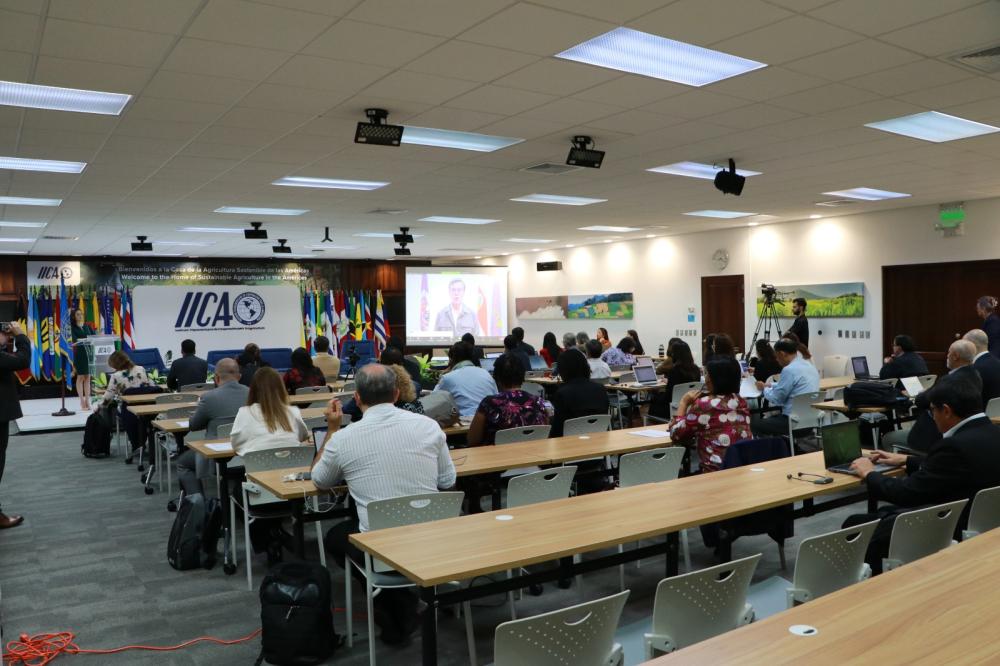The incorporation of producers and rural communities is key to the drafting of actions designed to simultaneously protect human, animal and environmental health, according to IICA Director General Manuel Otero and specialists taking part in a meeting organized by the Institute and the USDA.

San José, September 18, 2023 (IICA). The Inter-American Institute for Cooperation on Agriculture (IICA), in collaboration with the United States Department of Agriculture (USDA), organized a meeting of experts in public health and animal, plant and environmental health with a view to boosting the implementation of the One Health concept and orienting the modernization of public health systems in the Americas.
At IICA headquarters in San José, specialists discussed the challenges that lie ahead, and the solutions offered by the One Health approach for the countries of the region. They explained how enhancing synergies among health systems would lead to improvements in health, production, sustainability and food quality, and called for rural communities and producers to be included in the teamwork involved in addressing the issue.
In the opening session of the event One Health in the Americas: The importance of inter-institutional collaboration in the hemisphere and its rural communities, IICA Director General Manuel Otero stressed that implementation of the approach called for active coordination at the regional level by the environment, agriculture, agricultural health and food safety and public health sectors, working with private sector stakeholders such as agricultural production systems and their value chains.
“The Institute will be working intensively to highlight the importance of inter-institutional collaboration across the Americas, placing emphasis on rural communities and the challenges they face, with a view to developing concrete proposals that support the growth of the agrifood sector,” Otero remarked.
One of the panel discussions focused on the main challenges involved in the implementation of One Health in the Americas, with the participation of specialists from the Pan American Health Organization (PAHO-WHO), the World Organization for Animal Health (WOAH), the United Nations Food and Agriculture Organization (FAO), the United Nations Environment Programme (UNEP), the WHO One Health High-Level Expert Panel (OHHLEP) and Argentina’s National Health and Agrifood Quality Service (SENASA).
The experts pointed up the difficulty of endeavoring to carry out comprehensive surveillance through the health systems of the countries of the Americas, highlighting the challenges involved in sharing the data managed by institutions to obtain the information needed to create tangible solutions.
Catya Martínez, WOAH subregional representative for Central America, said it was vital to create legislation in aid of the One Health approach. “We have to begin by identifying each country’s needs and then prioritize actions accordingly, because the problems in each region and nation are different. Then our efforts will be successful,” she added.
Madhur Dhingra, FAO Senior Animal Health Officer and Head of the Emergency Prevention System for Animal Health, seconded her colleague’s comments. She also spoke about the importance of data and information management in this field.
“The databases of phytosanitary services are key to decision-making and to offering real support to those having to deal with emergencies,” she remarked.
Diego Quiroga, SENASA’s National Director of Plant Protection, also commented that it was now generally agreed that data could be transformed into real, concrete information that would finally make it possible to construct impact indicators under the aegis of the One Health approach.
Natalia Cediel, professor, associate researcher and member of the OHHLEP, mentioned the importance of gender inclusion and equity in the work carried out under the One Health approach. She suggested that rural women needed to be directly involved in the various working groups; their experience in the countryside meant they were uniquely qualified to point out and share information about the problems faced on a daily basis.
“The generation of scientific evidence and the documentation of success stories in the area of One Health in our countries will show us the aspects on which we should focus our work,” Cediel added.
Another panel member was Manuel Sánchez, PAHO-WHO Coordinator of the Area of Epidemiology and Information Systems, who added that the challenges facing the sector included the lack of solid intersectoral work structures.
Iván Fabrizzio Canaval Díaz, UNEP’s Regional One Health Focal Point, suggested that one of the main solutions was to begin to explore and document each country’s priorities and create frameworks for collaboration to orient the work at the regional level.
“Prioritization based on the results of the exploratory work is essential, to pinpoint where the resources need to be invested,” Canaval Díaz emphasized.
The panel members also highlighted the design of policies as one of the biggest challenges the region faced in this area, policies that would make it possible to unify the efforts of the areas of human, animal and environmental health to address a number of problems, including zoonotic diseases and environmental degradation.
More information:
Institutional Communication Division.
comunicacion.institucional@iica.int











